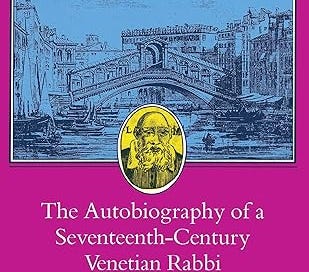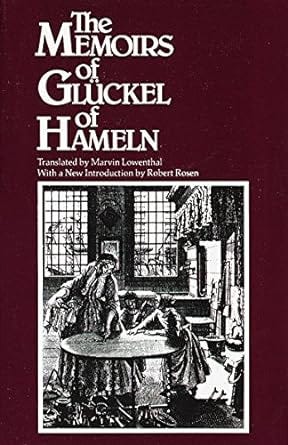Leon Modena was a rabbi living in Venice in the first half of the seventeenth century. Glückel of Hameln was a merchant’s wife and businesswoman in her own right living in Hamburg at the end of the seventeenth and beginning of the eighteenth centuries. Both were central parts of their respective Jewish communities, and both have one other thing in common: they wrote memoirs.
Memoirs are fruitful sources for historical novelists in particular, as they tend to shed light on aspects of life that are rarely documented otherwise. From his letters and official documents, we know a great deal about Leon Modena’s accomplishments and his involvement in community life; it’s only from his autobiography that we know about more personal struggles—his heartbreak over the death of his sons, his gambling addiction, and his financial troubles. This is even more true for Glückel of Hameln, whose story we would likely not otherwise know at all, except that she wrote it down.
Both memoirs provide a rare window into day-to-day life for their writers, along with all the hopes and cares that attend it. And although these two writers were separated by decades, gender, culture, and geography, their memoirs have a surprising amount in common. From them, we can infer a great deal not only about the particular perspectives of these two individuals, but about life in the Jewish communities in which they lived.
Interestingly enough, both writers give grief as the reason for taking on the task of writing their life’s stories. Leon Modena writes after the death of his firstborn son, Mordecai, saying that he’d long intended to write his autobiography so he could bequeath it to him as a legacy:
But for those twenty-four years up o the present I did not succeed in writing this down as a memoir in a book. Now that God has taken away my joy [his son]—it being two months since God took him away, leaving me desolate and faint all day long—my soul has refused to be comforted, for I will go to my grave mourning for my son …1
Glückel, writing after the death of her first (and beloved) husband, likewise claims to be writing for her children. But while Leon hopes to leave a legacy, Glückel’s purpose is more therapeutic. She writes “in hope of distracting my soul from the burdens laid upon it, and the bitter thought that we have lost our faithful shepherd.”2 For Glückel, memoir-writing is not just about bequeathing a legacy to her children; rather, she hopes it will be a source of comfort to them as well in the aftermath of their father’s death.
Given this farming, it’s perhaps less surprising then that these memoirs focus primarily on familial and domestic topics, only obliquely referencing political events. Memory plays and important role in both comforting the grieving and in constructing community identity.
This is true of Leon’s memoir as well as Glückel’s, even though Leon is a prominent member of his community and is self-consciously aware of his legacy. In his autobiography, Leon pays little attention to his writings as a rabbi or the debates he was engaged in. He focuses instead on his extensive family tree and the ebb and flow of his own and his family’s fortunes.
The significance of the memoir-writing exercise for both writers is not one of writing history. Neither writer is concerned with legacy in the sense of finding his or her place in historical events, but of situating their lives within that of their families and communities.
The exception is the often fraught relationship between the Jews and the Christian communities they lived among. Leon recounts the 1630 plague in Italy and its long-lasting effects on the Jewish community: “For approximately a year Jews have been forbidden to buy and sell or engage in business negotiations; hence there has been no earning. The government also took more than 120,000 ducats from the Jews.”3 He also writes in detail about his terror of being brought before the Inquisition for his writings:
My heart immediately began pounding, and I went to look at a copy of [the book] that I still had … I saw four or five things of importance of which it is forbidden to speak, much less to write, and needless to say to print, against the will of the Inquisition. Heartbroken, I shouted and tore at my beard until I almost lost my breath. I said to myself, “When this book is seen in Rome, it will become a stumbling block for all the Jews and for me, in particular. They will say, ‘How insolent are they to print in the vernacular, informing Christians not only of their laws, but also of some matters contrary to our religion and our beliefs.’”4
Glückel’s family history likewise recounts several episodes of oppression of the Jews, including the expulsion of the Jews from Hamburg when she was a child, and she personally recalls a particularly tense event in a Jewish woman in the community accused a Gentile of being a serial killer luring Jewish men to their deaths. The Jewish community receives permission to search the accused’s house for the body of one of the murdered men, but they are warned: “‘Take you heed, if the body be not found, you are all of you done for. You know right well what sort the Hamburg rabble are—we could never hold them back.’”5
Fortunately for both Leon and the Jewish community of Hamburg, both events work out in the end—the body is found, the Inquisition never comes knocking at Leon’s door; however, the precarity of Jewish life under Christian authorities, and the watchfulness they need to employ in going about their day to day activities, is clear.
Religion also holds a prominent place in both memoirs. This is unsurprising for the time period, where day-to-day life was infused with religious language. Leon is a rabbi with a wide education and quotes the Torah extensively, but Glückel is no less well-versed. In fact, at the opening of her memoir, she sets out her main theme for her children—that they should rely on God and by extension on the Torah, which she describes as a “rope the great and gracious God has thrown to us as we drown in the stormy sea of life, that we may seize hold of it and be saved.”6
Now, of course, differences in these two memoirs abound. The writers are separated not only by time and geography but by class, gender, and status. These are the works of two distinct individuals, and that comes through in their writing.
Leon is a rabbi straddling the medieval world and the modern, a Renaissance character born some two hundred years after the Renaissance. He dabbles in astrology; his beloved son’s death is the result of an accident while conducting alchemical experiments; he spars with his critics over his gambling habit. He has regular interactions with Gentiles when publishing his writings.
Glückel is a wife, mother, and businesswoman. She gives birth to fourteen children, while also conducting business first on her husband’s behalf and, after his death, in her own name. Doubtless in running her business she had many interactions with Gentiles, but she rarely mentions them, focusing instead on her widespread German Jewish network. Her family is far wealthier than Leon’s, though the nature of the time period and of Jewish life means that she still frets over the security of her family, and their fortunes have their peaks and valleys.
Leon may be the better educated of the two, but Glückel is a natural storyteller. Her memoirs are full of compelling anecdotes that reveal not only her worries, but also her rich sense of humor. Her memoir is populated with characters called “Green Moses,” “Bullet-proof Jacob” and as servant she calls Elegant Sam, “for we once had another servant whom the children dubbed Clumsy Sam.”7 In one particularly memorable incident, she looks back with humor on the panic caused by the discovery of a mysterious lump on her child’s neck during a plague outbreak, recalling a feeling all-too-familiar to any parent who ever freaked out about something that turned out to be nothing.
Reading memoirs like this can be a treasure trove of small details that can enrich historical writing, but it’s also important to remember that no one individual can represent an entire community. Where Glückel and Leon’s memoirs cover similar territory points to values they both shared, even in their very different lives, and it should make our imaginations richer when we think about history and the people who lived through it.
Modena, Leon. The Autobiography of a Seventeenth-Century Venetian Rabbi: Leon Modena’s Life of Judah. trans Mark R. Cohen. (Princeton, 1980), pp. 75-76.
Hameln, Glückel. The Memoirs of Glückel of Hameln. trans Marvin Lowenthal. (New York, 1977), p. 1.
Modena, p. 135.
Modena, p. 147
Hameln, p. 192.
Hameln, p. 1.
Hameln, p. 93-94.






